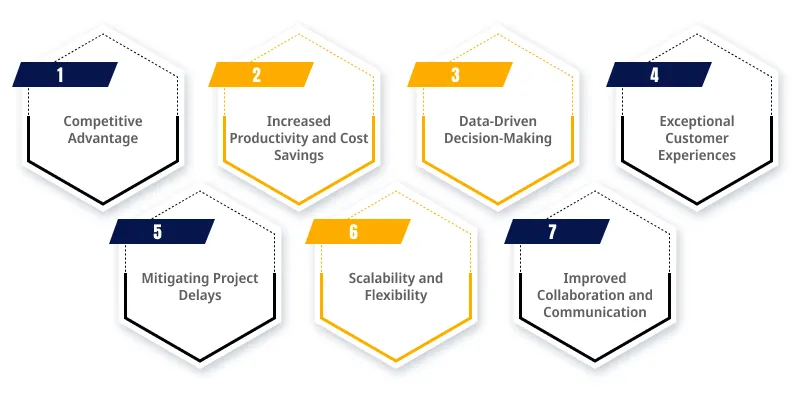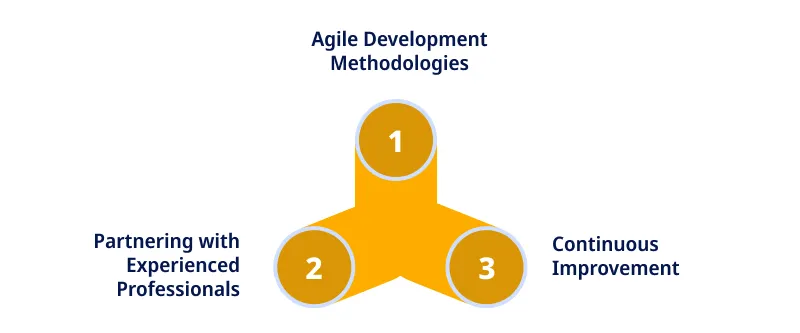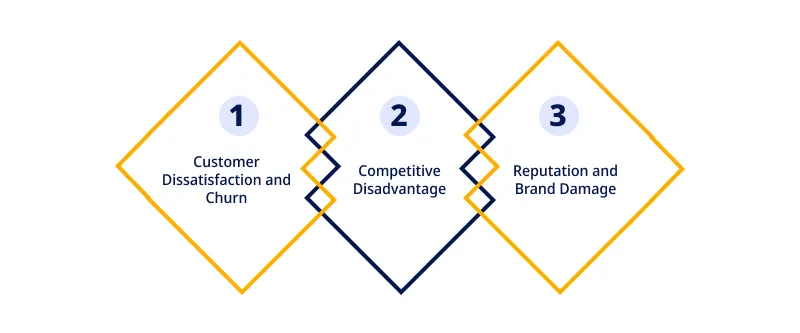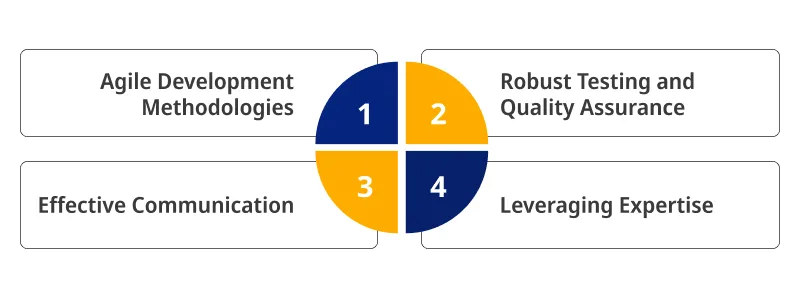“Delaying software development is like trying to drive a car with a flat tire – you may still move forward, but you’re significantly slowing down your progress and risking being left behind in the fast-paced race of the digital age.” – Bill Gates
Businesses constantly strive to stay ahead of the curve and maintain a competitive edge. However, one of the most overlooked software development challenges is the impact of delays.
Even a minor delay can have far-reaching consequences, hampering your business’s growth and profitability.
Reports show that even a 10% overrun for capital expenditure projects can lead to a staggering $5 million profit loss. This statistic alone shows the importance of timely and efficient software development.
This blog post will discover the hidden costs and consequences of postponing software development, exploring the potential impact on your business’s competitiveness, customer satisfaction, and bottom line.
By understanding these consequences, you can make informed decisions and prioritize the timely development of software solutions, ensuring your business outperforms the competition and capitalizes on emerging opportunities.
Why Software Development Matters?
The software has emerged as a critical competitive advantage for businesses across all industries in the rapidly evolving digital age. Implementing cutting-edge software solutions empowers organizations to enhance operational efficiency, streamline processes, and deliver exceptional customer experiences – factors that ultimately drive growth and success.
Partner with ValueCoders for scalable, cloud-native software development.
Failing to prioritize software development can expose your business to many challenges, including missed opportunities, revenue loss, and diminished market share.
In contrast, timely and strategic software development initiatives can propel your organization to new limits, enabling you to stay ahead of the competition and capitalize on emerging trends.
Some advantages of prioritizing software development include:
- Competitive Advantage: Well-designed software solutions enable businesses to enhance efficiency, streamline operations, and deliver superior customer experiences, giving them a significant edge over competitors.
- Increased Productivity and Cost Savings: By automating and optimizing various processes through software, organizations can boost productivity while reducing operational costs.
- Data-Driven Decision-Making: Sophisticated software solutions facilitate seamless data analysis, providing valuable insights that inform strategic decision-making and drive innovation.
- Exceptional Customer Experiences: In today’s digital age, customers expect personalized, user-friendly experiences, which can be consistently delivered through continuously evolving software offerings, fostering customer loyalty and attracting new business opportunities.
- Mitigating Project Delays: Hiring dedicated software development teams and leveraging software development services can help organizations avoid and overcome project delays, ensuring the timely delivery of high-quality software solutions.
- Scalability and Flexibility: Well-designed software systems can adapt to changing business needs, enabling organizations to scale operations seamlessly and remain agile in the face of evolving market conditions.
- Improved Collaboration and Communication: Collaborative software tools can enhance teamwork, facilitate efficient communication, and streamline workflows, contributing to overall organizational productivity.
By recognizing these advantages and prioritizing software development, businesses can place themselves for long-term success in an increasingly digital and competitive landscape.
To avoid and overcome project delays that often plague software development initiatives, many organizations are turning to the expertise of dedicated software development teams.
By partnering with experienced professionals specializing in software development services, businesses can streamline processes, mitigate risks, and ensure the timely delivery of high-quality software solutions.
Adopting software development is no longer an option but is necessary for businesses seeking to thrive in an increasingly digital world. By prioritizing software development and collaborating with skilled professionals, you can unlock opportunities, drive innovation, and solidify your competitive edge in the market.
Also read: 5 Reasons Your Company Should Opt For Software Development Outsourcing
Hidden Costs of Delay Uncovering Hidden Expenses
While the immediate impacts of software development challenges and project delays may seem manageable, the long-term consequences can be far more insidious and costly than initially anticipated.
Organizations that fail to prioritize timely software development often grapple with hidden expenses that can erode profitability and impede growth.
1. Opportunity Costs
One of the most significant hidden costs of software project delays is the opportunity cost – the potential revenue and market share a business loses by failing to capitalize on emerging opportunities.
In today’s fast-paced digital landscape, timing is everything. Delaying the launch of a new software product or feature can result in missed opportunities, allowing competitors to gain a foothold and capture a larger market share.
Optimize your budget and deadlines with ValueCoders' software development strategies.
2. Technical Debt Accumulation
Another hidden cost associated with software development delays is the accumulation of technical debt. Shortcuts are often taken when projects are postponed or rushed, leading to suboptimal code quality, increased complexity, and decreased maintainability.
Over time, this technical debt compounds, making future updates and enhancements increasingly difficult and costly to implement.
3. Reduced Efficiency and Productivity
Outdated or inefficient software systems can significantly hamper organizational efficiency and productivity.
As technology evolves, legacy systems become increasingly cumbersome, leading to manual workarounds, redundant processes, and decreased employee satisfaction. This hidden cost manifests in reduced output, higher operational costs, and diminished competitiveness.
To avoid business software delays and the associated hidden costs, organizations must prioritize timely software development and consider the following strategies:
- Agile Development Methodologies: Adopting Agile principles and practices can help businesses streamline software development processes, enabling faster delivery, increased flexibility, and better collaboration.
- Partnering with Experienced Professionals: Hiring software developers or collaborating with an experienced offshore software development company can provide access to specialized expertise, streamlined processes, and proven methodologies for delivering high-quality software solutions on time and within budget.
- Continuous Improvement: Regularly assessing and optimizing software development processes, leveraging automation tools, and fostering a culture of continuous learning can help mitigate the truth about software project delays and associated costs.
By proactively addressing software development challenges and prioritizing timely delivery, businesses can avoid the hidden costs of delays, stay ahead of the competition, and unlock new opportunities for growth and success.
Also read: Setting Up A Dedicated Offshore Development Center
Customer Impact Meeting Customer Expectations
In the rapidly evolving digital landscape, customer expectations constantly rise, posing significant software development challenges for businesses. Failure to meet these expectations can have far-reaching consequences, including customer dissatisfaction, loss of loyalty, and diminished competitive advantage.
1. Customer Dissatisfaction and Churn
One of the most direct impacts of delayed software releases is customer dissatisfaction.
When customers anticipate new features, improved functionality, or enhanced user experiences, delays can lead to frustration and a perception of neglect. This dissatisfaction can ultimately result in increased customer churn, as customers may seek alternative solutions that meet their evolving needs better.
2. Competitive Disadvantage
Another critical consequence of software project delays is the risk of falling behind competitors. In today’s fast-paced market, competitors constantly innovate and introduce new software solutions to capture market share. Challenges causing software project delays can leave businesses playing catch-up, struggling to match the capabilities and features offered by their rivals.
3. Reputation and Brand Damage
Delays in software development can also harm a company’s reputation and brand image. Customers and industry stakeholders may perceive delays as a sign of inefficiency, lack of commitment, or poor resource management. This negative perception can erode trust and make attracting and retaining customers, investors, and top talent increasingly difficult.
To mitigate these customer impact risks, businesses must prioritize the following:
- Agile Development Methodologies: Adopting Agile principles and practices can help organizations respond quickly to changing customer needs, fostering iterative development and continuous improvement.
- Robust Testing and Quality Assurance: Implementing rigorous testing and quality assurance processes can assist in identifying and resolving problems that delay software projects, ensuring that releases meet customer expectations and adhere to industry standards for security in software development.
- Effective Communication: Managing open and transparent communication with customers throughout the software development lifecycle can help manage expectations, build trust, and foster long-term loyalty.
- Leveraging Expertise: Partnering with experienced professionals who offer comprehensive software product development services can provide access to best practices, specialized skills, and proven methodologies for delivering high-quality software solutions that consistently meet or exceed customer expectations.
By prioritizing customer satisfaction and implementing strategies to mitigate software development challenges, businesses can retain existing customers and position themselves as industry leaders, attracting new customers and driving sustainable growth.
Strategies for Mitigating Risks
Recognizing the significant software development challenges and the potential impact of a delayed software project, businesses must adopt proactive strategies to prevent risks and ensure timely delivery.
By implementing the following approaches, organizations can minimize the cost of delays in software and maintain a competitive edge in the market.
Strategy 1: Embrace Agile Methodologies
One of the most effective strategies for mitigating risks and ensuring timely software delivery is the adoption of Agile methodologies. Agile principles emphasize iterative development, continuous collaboration, and rapid adaptation to changing requirements. By breaking projects into smaller, manageable sprints and fostering cross-functional teamwork, Agile methodologies enable organizations to identify and address issues early, reduce rework, and deliver value to customers more frequently.
Strategy 2: Invest in Automation and Top Software Development Tools
Leveraging top software development tools and automation can significantly streamline processes, reduce manual effort, and enhance overall efficiency. Automated testing frameworks, continuous integration and deployment pipelines, and code analysis tools can help identify and mitigate issues early in the development cycle, minimizing the risk of delays and ensuring high-quality software delivery.
Strategy 3: Foster Collaborative Partnerships
Partnering with experienced software outsourcing services providers or enterprise software development experts can provide access to specialized expertise, proven methodologies, and best practices for efficient software delivery. These collaborative partnerships can help organizations augment their in-house capabilities, leverage scalable resources, and benefit from the latest industry trends and techniques.
Strategy 4: Prioritize Quality Assurance and Testing
Robust quality assurance and testing processes are crucial for mitigating risks and ensuring that software meets customer expectations. By implementing comprehensive testing strategies, including unit testing, integration testing, and user acceptance testing, organizations can identify and resolve defects early in the development cycle, reducing the likelihood of costly delays and rework.
Strategy 5: Cultivate a Culture of Continuous Improvement
Encouraging a culture of ongoing enhancement within the software development team is crucial for identifying and addressing potential bottlenecks, inefficiencies, and areas for optimization. Regular retrospectives, process reviews, and continuous learning opportunities can help teams identify and implement improvements, leading to more efficient and timely software delivery.
Future-proof your business by partnering with ValueCoders for timely software development solutions.
By adopting these strategies and actively addressing software development challenges, businesses can minimize the risks associated with delays, enhance customer satisfaction, and maintain a competitive advantage in the ever-evolving digital landscape.
In Closing
Businesses cannot afford to overlook the consequences of delays in a software development project in the fast-paced digital era. The hidden costs, customer dissatisfaction, and competitive disadvantages associated with software development challenges can severely hamper growth and profitability.
Key Takeaways:
- Delayed software releases result in missed opportunities and potential revenue loss.
- Postponing projects accumulate technical debt, increasing future development costs.
- Failure to meet expectations can drive customers away and damage the brand’s reputation.
- Delays enable competitors to gain a competitive edge, capturing market share.
Organizations can consistently meet customer expectations, deliver high-quality software solutions, and maintain a competitive edge by taking proactive steps to reduce software development costs and mitigate delays.
Partner with ValueCoders, a leading provider of application development services, and leverage our expertise in choosing the right software development methodology for your unique needs.
Our experts will collaborate closely to ensure timely and efficient software delivery, enabling your business to thrive in the digital landscape.











